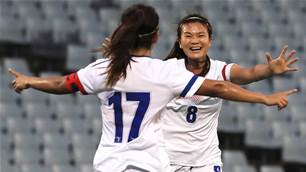EXCLUSIVE: Former All-White Danny Hay has urged Kiwi football powerbrokers to push for a move out of Oceania - even if it risks future World Cup qualification for New Zealand.
The former Leeds United, Walsall and Perth Glory defender argues that meaningful games in a confederation like AFC will be of greater long-term benefit to New Zealand than staying in Oceania – despite the present scenario offering a good chance for the Kiwis to qualify regularly for World Cups.
As an example, the All-Whites have been able to attract Honduras and Paraguay for friendly matches in New Zealand over the next week. But Hay says while these games indicate the Kiwis' improving stocks, they are not enough.
“People now genuinely recognize there are opportunities for the game [in New Zealand],” Hay told au.fourfourtwo.com at the recent Nike The Chance Pacific trials in Canberra.
“You can put on as many friendly games as you like but it’s meaningful games that actually count, be it World Cup qualifiers, Asian Cup that really are going to generate that public interest.
“We could beat Honduras 3-0 but do we care in the bigger scheme of things? I’m not sure. What we really need to do is to jump to Asia – if we possibly can. Even joining CONCACAF?”
Not only did the All-Whites qualify for the World Cup first time since 1982 but they also stunned the world by finishing unbeaten and above Italy in their group, almost snatching a place in the knockout phase in South Africa.
And in the lead-up to the World Cup New Zealand outshone the Socceroos in Melbourne despite losing 2-1. Ricki Herbert’s men also defeated Serbia in a European-based friendly before their unforgettable African adventure.
“Ever since the day we beat Bahrain and qualified for the World Cup the game’s been on a genuine high," said Hay, capped 31 times over an 11-year period before retiring from the national team in 2007.
"Working in a school like I did it used to be very much a rugby school and now football’s got such a profile – and that’s thanks basically to what the All-Whites have done.
“And the way they performed at the World Cup has kept it rolling on.”
And it’s this that Hay wants to see continue even if qualifying for World Cups and Confederation Cups would be harder outside of OFC. But it’s a chance he said is worth taking.
“There’s nothing to be afraid of,” he added. “I look at the way we performed at the World Cup and I don’t think there is anything to be afraid of at that top level for us going into Asia.
“We drew with Bahrain 0-0 and you need to be able to put on that backs-to-the-wall stuff on the road then playing at home as the Phoenix have shown not too many teams can cope – it’s bloody difficult down at Wellington and even the Aussie teams who know what they’re up against and even they struggle."
If the move into Asia was rubber-stamped, the Kiwis' national team schedule would radically change. Rather than playing an OFC Nations Cup every four years, Confederations Cup campaigns and a one-off World Cup two-legged World qualifier with AFC, there’d be at least seven home World Cup qualifiers over 18 months.
On top of that, there are AFC Asian Cup qualifiers and potentially Asian Cup tournaments. And that’s just for the senior national team. As Australia has found out, the international program within AFC is ramped up significantly across the board of national teams.
However, what would happen to Oceania if New Zealand left? And would AFC want the Kiwis anyway? When asked about New Zealand earlier this year Junji Ogura, an AFC and FIFA Executive Committee member, seemed non-plussed.
"I think in Oceania that they are working very hard to develop their own football scene," he said. "If New Zealand were to join the AFC there would then be the question of what would we do about the rest of the countries in Oceania?"
Hay added a move out of OFC was critical for the long-term development of this growing regional power. “It might not be the short-term gain if we want to get our game up to the standard and regularly compete we need to do something like that.
“Yes, Australia, Japan and South Korea will always be strong but we can compete against the likes of Iran, Iraq and Bahrain."
He added: "We should hold no fear whatsoever against those types of teams and the more we play them in real games – World Cup qualifiers for example – the better we’ll become as a nation and the more Ryan Nelsons we’ll develop.”
Related Articles

Former Socceroo, technical director among new Aussies elected to AFC

Cahill nominated for AFC's greatest World Cup player












